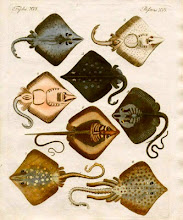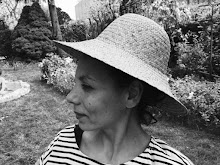WAKING IN THE BLUE
The night attendant, a B.U. sophomore,
rouses from the mare's-nest of his drowsy head
propped on The Meaning of Meaning.
He catwalks down our corridor.
Azure day
makes my agonized blue window bleaker.
Crows maunder on the petrified fairway.
Absence! My hearts grows tense
as though a harpoon were sparring for the kill.
(This is the house for the "mentally ill.")
What use is my sense of humour?
I grin at Stanley, now sunk in his sixties,
once a Harvard all-American fullback,
(if such were possible!)
still hoarding the build of a boy in his twenties,
as he soaks, a ramrod
with a muscle of a seal
in his long tub,
vaguely urinous from the Victorian plumbing.
A kingly granite profile in a crimson gold-cap,
worn all day, all night,
he thinks only of his figure,
of slimming on sherbert and ginger ale--
more cut off from words than a seal.
This is the way day breaks in Bowditch Hall at McLean's;
the hooded night lights bring out "Bobbie,"
Porcellian '29,
a replica of Louis XVI
without the wig--
redolent and roly-poly as a sperm whale,
as he swashbuckles about in his birthday suit
and horses at chairs.
These victorious figures of bravado ossified young.
In between the limits of day,
hours and hours go by under the crew haircuts
and slightly too little nonsensical bachelor twinkle
of the Roman Catholic attendants.
(There are no Mayflower
screwballs in the Catholic Church.)
After a hearty New England breakfast,
I weigh two hundred pounds
this morning. Cock of the walk,
I strut in my turtle-necked French sailor's jersey
before the metal shaving mirrors,
and see the shaky future grow familiar
in the pinched, indigenous faces
of these thoroughbred mental cases,
twice my age and half my weight.
We are all old-timers,
each of us holds a locked razor.
* * *
SKUNK HOUR
(For Elizabeth Bishop)
Nautilus Island's hermit
heiress still lives through winter in her Spartan cottage;
her sheep still graze above the sea.
Her son's a bishop. Her farmer
is first selectman in our village,
she's in her dotage.
Thirsting for
the hierarchic privacy
of Queen Victoria's century,
she buys up all
the eyesores facing her shore,
and lets them fall.
The season's ill--
we've lost our summer millionaire,
who seemed to leap from an L. L. Bean
catalogue. His nine-knot yawl
was auctioned off to lobstermen.
A red fox stain covers Blue Hill.
And now our fairy
decorator brightens his shop for fall,
his fishnet's filled with orange cork,
orange, his cobbler's bench and awl,
there is no money in his work,
he'd rather marry.
One dark night,
my Tudor Ford climbed the hill's skull,
I watched for love-cars. Lights turned down,
they lay together, hull to hull,
where the graveyard shelves on the town. . . .
My mind's not right.
A car radio bleats,
'Love, O careless Love . . . .' I hear
my ill-spirit sob in each blood cell,
as if my hand were at its throat . . . .
I myself am hell,
nobody's here--
only skunks, that search
in the moonlight for a bite to eat.
They march on their soles up Main Street:
white stripes, moonstruck eyes' red fire
under the chalk-dry and spar spire
of the Trinitarian Church.
I stand on top
of our back steps and breathe the rich air--
a mother skunk with her column of kittens swills the garbage
pail.
She jabs her wedge-head in a cup
of sour cream, drops her ostrich tail,
and will not scare.
* * *
TERMINAL DAYS AT BEVERLY FARMS
At Beverly Farms, a portly, uncomfortable boulder
bulked in the garden’s center–
an irregular Japanese touch.
After his Bourbon “old fashioned,” Father,
bronzed, breezy, a shade too ruddy,
swayed as if on deck duty
under his six pointed star-lantern–
last July’s birthday present.
He smiled his oval Lowell smile,
he wore his cream gabardine dinner-jacket,
and indigo cummerbund.
His head was efficient and hairless,
his newly dieted figure was vitally thin.
Father and Mother moved to Beverly Farms
to be a two-minute walk from the station,
half an hour by train from the Boston doctors.
They had no sea view,
but sky-blue tracks of the commuters’ railroad shone
like a double-barreled shotgun
through the scarlet late August sumac,
multiplying like cancer
at their garden’s border.
Father had had two coronaries.
He still treasured underhand economies,
but his best friend was his little black Chevy,
garaged like a sacrificial steer
with gilded hooves,
yet sensationally sober,
and with less side than an old dancing pump.
The local dealer, a “buccaneer,”
had been bribed a “king’s ransom”
to quickly deliver a car without chrome.
Each morning at eight-thirty,
inattentive and beaming,
loaded with his “calc” and “trig” books,
his clipper ship statistics,
and his ivory slide rule,
Father stole off with the Chevy
to loaf in the Maritime Museum at Salem.
He called the curator
“the commander of the Swiss Navy.”
Father’s death was abrupt and unprotesting.
His vision was still twenty-twenty.
After a morning of anxious repetitive smiling,
his last words to Mother were:
“I feel awful.”
* * *
DOLPHIN
My Dolphin, you only guide me by surprise,
captive as Racine, the man of craft,
drawn through his maze of iron composition
by the incomparable wandering voice of Phèdre.
When I was troubled in mind, you made for my body
caught in its hangman’s-knot of sinking lines,
the glassy bowing and scraping of my will. . . .
I have sat and listened to too many
words of the collaborating muse,
and plotted perhaps too freely with my life,
not avoiding injury to others,
not avoiding injury to myself–
to ask compassion . . . this book, half fiction,
an eelnet made by man for the eel fighting–
My eyes have seen what my hand did.
* * *
FOR THE UNION DEAD
"Relinquunt Omnia Servare Rem Publicam."
The old South Boston Aquarium stands
in a Sahara of snow now. Its broken windows are boarded.
The bronze weathervane cod has lost half its scales.
The airy tanks are dry.
Once my nose crawled like a snail on the glass;
my hand tingled
to burst the bubbles
drifting from the noses of the cowed, compliant fish.
My hand draws back. I often sigh still
for the dark downward and vegetating kingdom
of the fish and reptile. One morning last March,
I pressed against the new barbed and galvanized
fence on the Boston Common. Behind their cage,
yellow dinosaur steamshovels were grunting
as they cropped up tons of mush and grass
to gouge their underworld garage.
Parking spaces luxuriate like civic
sandpiles in the heart of Boston.
A girdle of orange, Puritan-pumpkin colored girders
braces the tingling Statehouse,
shaking over the excavations, as it faces Colonel Shaw
and his bell-cheeked Negro infantry
on St. Gaudens' shaking Civil War relief,
propped by a plank splint against the garage's earthquake.
Two months after marching through Boston,
half the regiment was dead;
at the dedication,
William James could almost hear the bronze Negroes breathe.
Their monument sticks like a fishbone
in the city's throat.
Its Colonel is as lean
as a compass-needle.
He has an angry wrenlike vigilance,
a greyhound's gently tautness;
he seems to wince at pleasure,
and suffocate for privacy.
He is out of bounds now. He rejoices in man's lovely,
peculiar power to choose life and die--
when he leads his black soldiers to death,
he cannot bend his back.
On a thousand small town New England greens,
the old white churches hold their air
of sparse, sincere rebellion; frayed flags
quilt the graveyards of the Grand Army of the Republic.
The stone statues of the abstract Union Soldier
grow slimmer and younger each year--
wasp-waisted, they doze over muskets
and muse through their sideburns . . .
Shaw's father wanted no monument
except the ditch,
where his son's body was thrown
and lost with his "niggers."
The ditch is nearer.
There are no statues for the last war here;
on Boylston Street, a commercial photograph
shows Hiroshima boiling
over a Mosler Safe, the "Rock of Ages"
that survived the blast. Space is nearer.
When I crouch to my television set,
the drained faces of Negro school-children rise like balloons.
Colonel Shaw
is riding on his bubble,
he waits
for the blessèd break.
The Aquarium is gone. Everywhere,
giant finned cars nose forward like fish;
a savage servility
slides by on grease.
* * *
FLORENCE
I long for the black ink,
cuttlefish, April, Communists
and brothels of Florence–
everything, even the British
fairies who haunted the hills,
even the chills and fever
that came once a month
and forced me to think.
The apple was more human there than here,
but it took a long time for the blinding
golden rind to mellow.
How vulnerable the horseshoe crabs
dredging the bottom like flat-irons
in their antique armor,
with their swordgrass blackbone tails,
made for a child to grab
and throw strangling ashore!
Oh Florence, Florence, patroness
of the lovely tyrannicides!
Where the tower of the Old Palace
pierces the sky
like a hypodermic needle,
Perseus, David and Judith,
lords and ladies of the Blood,
Greek demi-gods of the Cross,
rise sword in hand
above the unshaven,
formless decapitation
of the monsters, tubs of guts,
mortifying chunks for the pack.
Pity the monsters!
Pity the monsters!
Perhaps, one always took the wrong side–
Ah, to have known to have loved
too many Davids and Judiths!
My heart bleeds black blood for the monster.
I have seen the Gorgon.
The erotic terror
of her helpless, big bosomed body
lay like slop.
Wall-eyed, staring the despot to stone,
her severed head swung
like a lantern in the victor’s hand.
Subscribe to:
Post Comments (Atom)




No comments:
Post a Comment